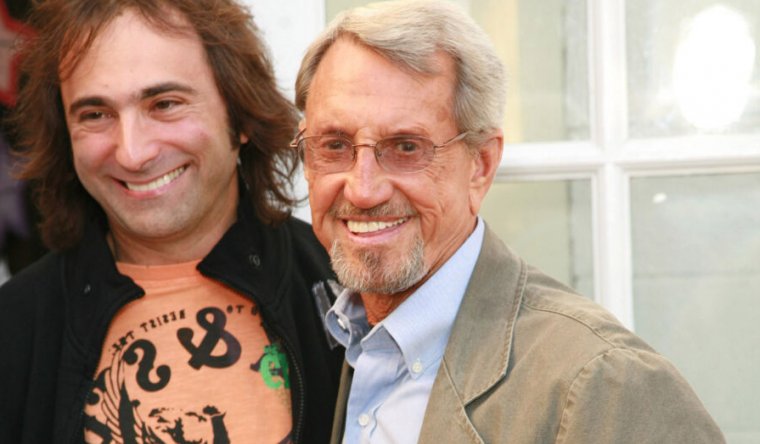
This September, British filmmaker Joshua Newton prepared to rerelease his 2009 film Beautiful Blue Eyes. The 2022 premiere was important to Newton, as he’d waited more than a decade to finally share with the world a version of the movie that was previously lost.
Roy Scheider starred in Newton’s movie, and it ended up being his final role. Scheider—who is best known for playing the beloved Jaws police chief who says, “You’re gonna need a bigger boat”—portrayed a New York cop who reunites with his estranged son and tracks down the Nazi responsible for murdering his family members during the Holocaust. Because a camera malfunctioned and damaged some of Newton’s footage and Scheider died while filming, Newton previously thought he’d lost the edit he liked best. But then more than a decade passed, and Newton told Rolling Stone that AI technology had finally advanced enough that the filmmaker could repair lost film frames.
Excited to put this cut of his thriller in front of audiences, Newton prepared to promote the rerelease on Facebook. But in the days leading up to the premiere, Newton told Rolling Stone that he received an email informing him that in a rare turn of events, “Facebook had banned the filmmakers from promoting or advertising” the movie.
Following Rolling Stone’s report, Meta told Ars the Facebook owner reviewed the case and decided to reverse the ban.
“We reviewed the ads and page in question and determined that the enforcement was made in error, so we lifted the restriction,” a Meta spokesperson told Ars.
Why was the film banned?
Facebook moderators told Newton that his film was banned because the company’s ad policy restricts content that “includes direct or indirect assertions or implications about a person’s race.” Because Newton’s movie in the US is titled Beautiful Blue Eyes, Facebook moderators banned its promotion in Facebook ads, seemingly reading the title as hinting at race.
Newton told Rolling Stone that his parents survived the Holocaust and that the movie was based on his late father’s life. His own son, Alexander Newton, featured in the film and performed its titular song. Alexander tweeted that his song was also banned on Facebook and Instagram.
“This is the action of haters—and there are sadly many in our society—who seek to damage the film in order to trivialize the Holocaust,” Joshua Newton told Rolling Stone. “Surely, Mark Zuckerberg did not intend this to happen.”
Newton’s production company did not immediately respond to Ars’ requests for comment since Meta lifted the ban.
How Facebook made its decision
According to Newton, after he received the email informing him that he would not be allowed to promote his film on Facebook, he immediately appealed the decision. Rolling Stone shared the message that Facebook sent in response to Newton’s appeal, informing the filmmaker that advertising and even trailers were “permanently restricted.”
“After a requested review of your Facebook account, we confirmed it didn’t comply with our Advertising Policies or other standards. You can no longer advertise using Facebook Products. This is our final decision,” the message said.
Newton’s movie is now being screened in hundreds of movie theaters that are also simultaneously rereleasing Jaws in IMAX. It’s a double feature that seems designed as a celebration of Scheider through his best-known and final roles. Newton said he is disgusted that Facebook has seemingly limited the reach of his film. Rolling Stone noted that Facebook has rarely taken such action in content reviews of movies, finding one other instance in 2020 when a pro-Trump documentary was censored ahead of the election.
“Every decent and sane human being on this planet should be alarmed by Meta-Facebook’s ban on the advertising of a Holocaust-related film,” Newton told Rolling Stone. “Mark Zuckerberg has created a monster that has no oversight. It’s one thing to be flagged by an algorithm. It’s another for Meta-Facebook employees to review the flag and uphold it, knowing full well that the title is not discriminatory and that the film is Holocaust-related.”
Newton told Rolling Stone that he is considering legal action against Facebook, but Meta told Ars that all restrictions on his movie’s Facebook page and ads have been lifted.
Increased scrutiny on Facebook censorship
Although resolved, Newton’s case adds another data point in the ongoing controversy over invalid censorship that has taken place on Facebook for years, with the government increasingly pressuring Facebook to beef up content moderation and the general public mostly confused over why and when certain content is restricted.
For years, the American Civil Liberties Union has taken the stance that Facebook shouldn’t censor any offensive speech—a policy that would ensure filmmakers like Newton never have to worry about how to promote their movies without Facebook.
Recently, there has been some new information shared publicly on Facebook content moderation decisions. The Wall Street Journal last week posted an opinion piece from its Editorial Board after emails shared in court showed how Facebook and other tech companies directly coordinate with federal officials to decide what gets removed. The WSJ board called on Facebook to release more emails so the public can better understand the government’s role in Facebook’s moderation practices.
https://arstechnica.com/?p=1882105

